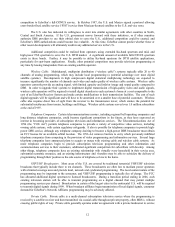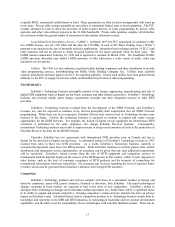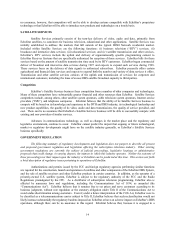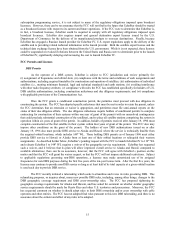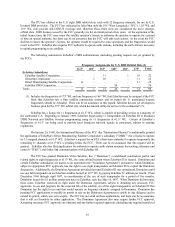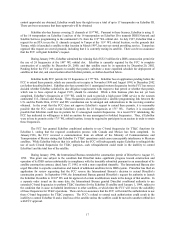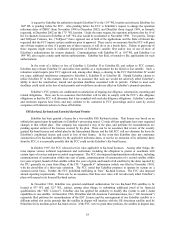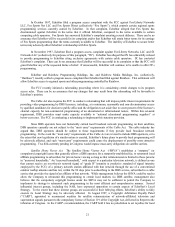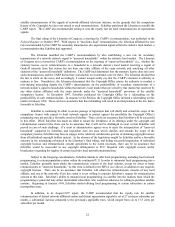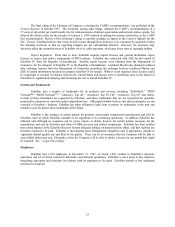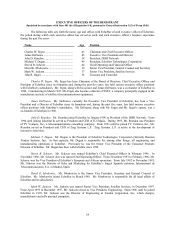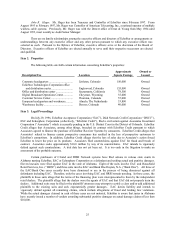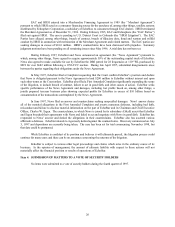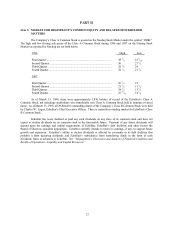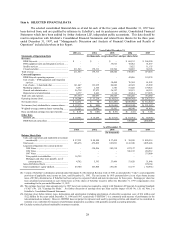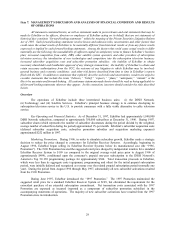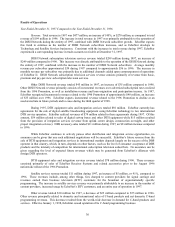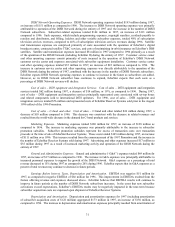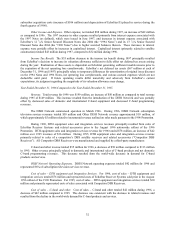Dish Network 1997 Annual Report Download - page 24
Download and view the complete annual report
Please find page 24 of the 1997 Dish Network annual report below. You can navigate through the pages in the report by either clicking on the pages listed below, or by using the keyword search tool below to find specific information within the annual report.22
satellite retransmissions of the signals of network-affiliated television stations, on the grounds that the compulsory
license of the Copyright Act does not extend to such retransmissions. EchoStar petitioned the Librarian to modify the
CARP report. The CARP also recommended setting at zero the royalty rate for local retransmissions of superstation
signals.
The final ruling of the Librarian of Congress, reviewing the CARP’s recommendation, was published in the
Federal Register in October 1997. With respect to “ local-into-local” retransmissions, the Librarian affirmed the zero
rate recommended by the CARP for secondary transmission of a superstation signal within the station’s local market, a
recommendation that EchoStar had supported.
The Librarian modified the CARP’s recommendation by also establishing a zero rate for secondary
transmissions of a network station’s signal to “ unserved households” within the station’s local market. The Librarian
of Congress also reviewed the CARP’s recommendation on the meaning of “ unserved households” (i.e., whether the
statutory license covers retransmissions to a household in a network station’s local market receiving a signal of
Grade B intensity from that station but not from any other affiliate of the same network and satisfying all other
elements of the “ unserved household” definition). The CARP had determined that the statutory license does not cover
such retransmissions and the CARP did not have jurisdiction to recommend a rate for them. The Librarian decided that
the law is silent on the issue, and accordingly, it cannot unequivocally say that the CARP’s decision is arbitrary or
contrary to law. Nonetheless, the Librarian determined that the Copyright Office retains the authority to conduct a
rule-making proceeding despite the CARP’s determination, on the permissibility of secondary transmissions of a
network station’s signal to households within that station’s local market that are served by that station but unserved by
any other station affiliated with the same network under the “ unserved household” provisions of the satellite
compulsory license. In December 1997, EchoStar petitioned the Copyright Office for a rulemaking on the
permissibility of such retransmissions. In response to the Petition, the Copyright Office initiated a rulemaking on this
matter in January 1998. There can be no assurance that this rulemaking will result in an interpretation of the law that is
favorable to EchoStar.
EchoStar is continuing its effort to secure passage of legislation that will clarify and extend the scope of the
compulsory license with respect to local network signals to protect against the possibility the Copyright Office’s
rulemaking may not provide a favorable result to EchoStar. There can be no assurance that EchoStar will be successful
in this effort. While EchoStar has made an effort to ensure the lawfulness of its offerings under the copyright and
retransmission consent rules, there can be no assurance that it will not be challenged in court or that EchoStar will
prevail in case of such challenge. If a court or administrative agency were to reject the interpretation of “ unserved
household” supported by EchoStar, and legislation does not pass which clarifies and extends the scope of the
compulsory license, EchoStar may have to engage in the relatively cumbersome process of obtaining copyright licenses
from all individual copyright holders instead. In the absence of the legislation sought by EchoStar and/or a favorable
outcome in the rulemaking referenced in the Librarian’s final ruling, and failing successful negotiation of individual
copyright licenses and retransmission consent agreements to the extent necessary, there can be no assurance that
EchoStar would be successful in any copyright infringement or FCC litigation with copyright owners and/or
broadcasters regarding the legality of certain local-into-local network retransmissions.
Subject to the foregoing considerations, EchoStar intends to offer local programming, including local network
programming, to certain population centers within the continental U.S. In order to retransmit local programming into a
market, EchoStar generally must obtain the retransmission consent of the local stations, except for direct to home
retransmissions to “ unserved households,” as this term is defined in the SHVA (see above), in addition to any requisite
copyright licenses. There can be no assurance that EchoStar will obtain the retransmission consents of any local
affiliate, and one of the networks (Fox) has stated it is not willing to consider EchoStar’s request for retransmission
consent at this time. EchoStar’s ability to transmit local programming via satellite into the markets from which the
programming is generated may attract incremental subscribers who would not otherwise be willing to purchase satellite
systems. Beginning in January 1998, EchoStar started offering local programming to certain subscribers in certain
metropolitan areas.
In addition, in its August 1997 report, the CARP recommended that the royalty rate for satellite
retransmissions of distant network-affiliated station and distant superstation signals be set at 27 cents per subscriber per
month, a substantial increase compared to the previously applicable rates, which ranged from six to 17.5 cents per
subscriber per month.


